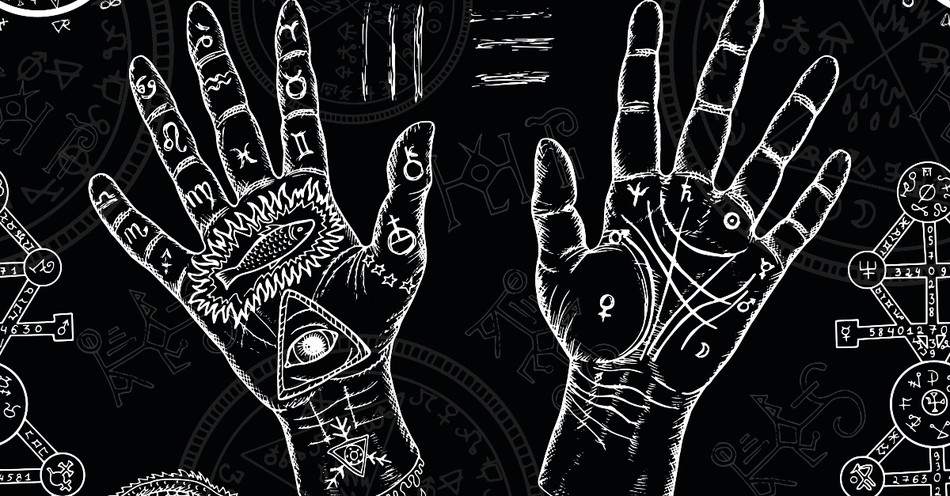Occultism is a general term to describe “various theories and practices involving a belief in and knowledge or use of supernatural forces or beings.” There is no single form of occultism. Sometimes, a person derives beliefs from occult practices; at other times, one selects occult practices because of external beliefs to which occultism molds itself.
Occultism Connotations
In the Western world, “occult” usually evokes evil connotations associated with witchcraft and sorcery, summoning the dead, and ritual sacrifice. In some Eastern cultures, however, religion and occultism are frequently blended into a morally neutral form. Western occult beliefs pertain to “secret philosophies” such as “Hellenistic magic and alchemy” combined with “Jewish mysticism.”
Occult practitioners are supposedly gifted with powers and knowledge available to specially chosen individuals or people of great intellect. Occultists or spiritualists, as they are sometimes known, seek “secret wisdom” such as the key to eternal life. The word “occult” means “hidden.”
The Occult and Hidden Knowledge
There are three ways to interpret this idea of “hidden knowledge:”
1. Knowledge available “only to initiates after proper preparation;” the sort which is “dangerous to the unprepared.” This “secret knowledge” cannot be made widely available lest one risk “profaning” it.
2. “Knowledge disguised by God for only the select few to comprehend.” There is an idea that God left clues, which only intellectuals chosen by God can interpret.
3. Knowledge reveals “realms, energies, or abilities” which most people do not see or recognize. This interpretation relates to magic and “anything supernatural or paranormal.” Many practitioners of occult arts blend “multiple paths” rather than committing to a single set of rules. For example, magic is not always incorporated; many occultists commune with the dead, but not all.
Meaning of Occultism in Modern Society
In the West at least, blending components from various religions and occult practices has become normal. One might believe in God, but also karma, the afterlife, Jesus, Buddha, Mohammed, and anything else that fits with one’s view on a particular subject. Being tied down to any form of “truth” is not essential; loving one’s self and autonomy are more important.
A recent article in The American Interest, “Progressive occultism — the language of witches and demons, of spells and sage, of cleansing and bad energy, of stars and signs — has become the de facto religion of millennial progressives.”
Practitioners seek “an umbrella community for all those pushed to the side by the dominant culture.” They are resisting the authority of a government led by white male evangelicals with an alternative, inclusive, supposedly secular world view; yet, they do so with everything from “tarot readings to spell craft, meditation to cursing.”
These Americans are “actively seeking out religious and spiritual traditions defined by their marginality” which, while “less established, and far more diffuse, than those offered by organized religion” still offer “some of the same psychological effects: a committed and ideologically cohesive community, a sense of purpose both on a political battlefield and a mythic one.”
In other words, the meaning of this belief system has nothing to do with faith yet requires one to suspend disbelief. Anything goes, as long as it works for the individual. There is no single truth; only subjectivism.
It’s a response to religiosity; to the Christian Pharisee who is more concerned with the law than with the people the law is supposed to serve and protect. But occultism replaces a single religion with an inconsistent and non-cohesive hodge-podge, its meaning derived more from what occultism is not than what it is.
Is the Occult Impotent or Evil?
Many individuals today argue there is no Devil; no supernatural force for evil. They play with Ouija boards and seances, believing there are no demons. “Many today would demythologize, reinterpret or otherwise explain away” evil spirits which “the biblical writers themselves clearly believed in.”
This view persists even among some churches where leaders “may deny that Satan is active today.” Those who engage in occult practices, however, believe in “the supernatural without God.” Either spirits are harmless, or occultists imagine themselves sufficiently powerful to handle malevolent spirits because they possess special knowledge.
Problem with the Occult: No Bedrock
One major problem with occultism is that it doesn’t offer any foundational beliefs; no unifying truth or rock-solid guidance, purpose, or leadership. Without a consistent core ideology, one cannot rely on “progressive occultism” for direction, protection, or peace.
The meaning of progressive occultism is tied up with the reason for rejecting the church rather than a positive response to solid evidence or convincing arguments in favor of a belief system.
Secondly, the supernatural realm is no playground. If evil demonstrates sinister power, occultists are defenseless. Many so-called “occultists” don’t believe in heaven, hell, demons, and angels. Tarot cards and Ouija boards are entertaining. The potential of experiencing a supernatural encounter is thrilling.
But there is a supernatural realm, the one Paul writes about in Ephesians. We fight against “the rulers, against the authorities, against the powers of this dark world and against the spiritual forces of evil in the heavenly realms” (Ephesians 6:12). Real warfare takes place around us all the time unseen.
Christ warns: “The individual who brushes evil spirits out of her house only invites many more of them into that clean and spacious environment if she does not fill it with the Holy Spirit” (Luke 11:24-26). Rejecting and defying evil is not enough; we need an alternative to fill the vacuum or it will be refilled by more demons, and only The Holy Spirit is powerful enough to resist them.
We are powerless in our own right, especially if we do not identify demons for what they are. Jesus says Satan “has blinded their eyes and hardened their heart, lest they see with their eyes, and understand with their heart, and turn, and I would heal them” (John 12:40).
Christianity and the Occult
1 Corinthians 10:20-21 says, “The sacrifices of pagans are offered to demons, not to God, and I do not want you to be participants with demons. You cannot drink the cup of the Lord and the cup of demons too; you cannot have a part in both the Lord’s table and the table of demons.”
If you worship pagan Gods, you cannot be part of God’s Kingdom through Christ. He clearly states you shall have no other gods besides Him, and without Christ’s Spirit, we cannot discern the evil one’s schemes. “Satan can also produce ‘signs and wonders’ which, however, lead away from the truth.”
If the meaning of life is to pursue signs and wonders, to have wishes granted for our immediate and temporal benefit, life possesses no meaning without signs and wonders and is unbearable when we suffer.
Occultism might entertain, but even if one does not experience demonic possession, there is a subtle danger that the Christian dabbling in occultism “just for fun” will stray from God’s peace. Satan can still torment one who is sealed for Christ even if he cannot steal that person’s promise of eternal life.
Some Christians argue that our supernatural ability to commune with Christ is a sign that we can also commune with the dead more generally. They are misled. Our God lives and reigns in the heavenly realms, so Christians do not commune with the dead but the living. Although supernatural phenomena are real and have been depicted in the Bible. Scripture tells us:
1. Some supernatural forces are evil. Satan’s demons seek to do us harm, no matter what lies they utter. God’s Word, however, is truth and life. While mysteries about God remain, God provides access to Himself for anyone who asks. His character, His wisdom, His commandments, and peace are available to every person, not only select initiates from a certain socio-economic or elite academic background.
2. Any positive supernatural experience comes from God by His power, not ours. We do not possess gifts of divination or magic. Examples such as Ezekiel’s out-of-body experience and dream interpretation by Daniel and Joshua “all happened by the power of God.”
Nebuchadnezzar’s astrologers and sorcerers could not tell the king what his dream meant. “During the night the mystery was revealed to Daniel in a vision. Then Daniel praised the God of heaven and said: “Praise be to the name of God for ever and ever; wisdom and power are his” (Daniel 2:19-20).
What Does the Occult Mean for Christians?
If one truly derives meaning from God’s Word and from a life submitted to His will, then occultism will not tempt or entertain. The Lord has strong words for those who take part in witchcraft, necromancy, and other occult practices:
Anyone who does these things is detestable to the LORD; because of these same detestable practices the LORD your God will drive out those nations before you (Deuteronomy 18:12).
Any time Christianity and the Occult enter a room together, they take opposing sides; they cannot reside simultaneously within the Christian.
©iStock/Getty Images Plus/VeraPetruk










